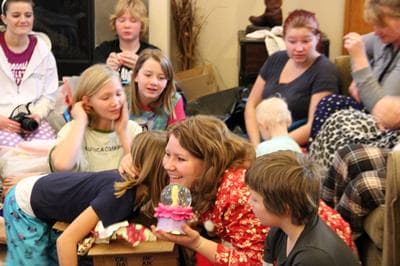Advertisement
A Comeback For Polygamy In Utah?
ResumePolygamy, sister wives, plural families get a boost from a court ruling in Utah. We'll ask, "What Now?"

In 1890, the US Supreme Court called polygamy “abhorrent to the sentiments of the civilized world.” Mormon Utah was required to ban the practice – sister wives and all – before it was granted statehood. Ten days ago, a federal judge in Utah – a George W. Bush appointee – said no to all that. Polygamous husbands and wives can’t all legally marry one another, he said, but they have every right to cohabitate and live as polygamously as they like. Critics say it’s proof we’re on a slippery slope after gay marriage. Supporters say its freedom. This hour On Point: polygamy unbound, again, in Utah.
- Tom Ashbrook
Guests
Howard Berkes, investigations correspondent for NPR, based in Salt Lake City.
Jonathan Turley, professor of law at The George Washington School of Law. He represented the polygamous Brown family from the TLC reality series, "Sister Wives." (@JonathanTurley)
Ken Klukowski, director of the Center For Religious Liberty at the Family Research Council. Senior legal analyst at Brietbart News. (@kenklukowski)
Kristyn Decker, a former spouse in a polygamous family. Author of "Fifty Years In Polygamy: Big Secrets and Little White Lies." (@KristynDecker)
From Tom's Reading List
Los Angeles Times: Polygamy supporters pleased that parts of Utah law are struck down -- "Proponents say polygamist cohabitation among fundamentalist Mormons traditionally involves one marriage certificate; any additional wives represent religion-based relationships that are protected under the Constitution. They say the judge's ruling has preserved laws against bigamy, which involves more than one marriage license. Waddoups ruled that while there was no 'fundamental right' to practice polygamy, the central issue was religious cohabitation, and that the language in the Utah law — 'or cohabits with another person' — should be struck."
Salt Lake Tribune: The Utah polygamy ruling: Questions and answers -- "In a nutshell, what did the judge say? He said the state could show no public interest in broad language that lumps cohabitation into the category of bigamy and the law was applied unevenly over the decades. Utah used it to prosecute people subscribing to early Mormon teachings and who were public about it rather than investigating anyone it suspected of breaking the statute. This, Waddoups said, amounted to violations of the First and 14th amendments."
The Daily Beast: Was Rick Santorum Right About Polygamy After All? — "A decade ago, Rick Santorum said polygamy, among other things, would be allowed if bans on sodomy were struck down by the Supreme Court. 'Sometimes I hate it when what I predict comes true,' the once and likely future Republican presidential candidate tweeted Sunday after a federal judge decriminalized polygamy in Utah. Judge Clark Waddoups ruled late Friday that parts of the state’s law are unconstitutional, based on a Supreme Court ruling that legalized sodomy across the nation."
This program aired on December 23, 2013.